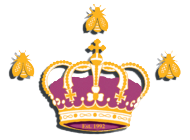As May arrives, bees that have been still since the autumn prepare for the season ahead, stirred by the new spring blossoms and pollens that fill the air with their heady, seductive perfumes
Urban settings such as Clapham, in south-east London, seem an unlikely place to find bees busily working away, gathering nectar from the smart window boxes and tidy cosmopolitan gardens in the area. But it is here that James Harnill has been spreading his passion for the apiarist’s art for the last ten years, at The Hive Honey Shop. As well as running the shop and a mail order business, which sells all things to do with bees, he is also a commercial bee-keeper, producing an impressive range of flavoured honeys.
For a man who comes from three generations of bee- keepers, his ardour has certainly not become jaded by time; rather, his passion for bees is infectious. Here, the locals can pop in to see the working beehive that is built into the wall of the shop; everyone is fascinated by the sight of thousands of bees going about their business, visible through a perspex window. Young children are brought in to visit on their way home from school; tearaway adolescents watch the bees in amazement and meekly ask James if he ever gets stung: ‘I’m a bee-keeper, I get stung all the time’, is the reply. They marvel at his tale of how, when his bees were once swarming, with his finely-tuned expert eye, he recognised the queen bee in front of him and plucked it from the air with his bare hand, like a martial arts expert, to bring the swarm under control. He must be asked the same basic questions about bees’ habits time and time again, but he always answers enthusiastically, such is his desire to inform people of the marvels and industry of these little creatures.
‘The flavours of honeys from different flowers are surprisingly varied and they are virtually impossible to mass produce,’ says James. ‘In the shop, we like to offer tasting samples of all our different honeys so customers can experience their subtle flavours for themselves: How the honey is extracted from the comb will have an effect on these individual flavours. He explains, ‘We extract the honey the old-fashioned way. After the comb is removed from the hive we cut across the face of the honeycomb with a knife and spin the honey out by centrifugal force. No heat is involved in the extraction so the subtle oils are retained and it is these that give the flavours. Mass-produced honeys are heat treated so you just end up with excessive sweetness and no subtlety: The honey is harvested three times a year to capture the particular tastes of the flowers that are abundant particularly within each period.
As well as comestibles, the shop sells every other product that is produced from bee-keeping. An exclusive range of cosmetic lotions and potions are made following tried and tested formulas that have been handed down through James’s family. Royal jelly and propolis are used for their health-giving properties and are made into supplements and tinctures, again following recipes from the familyarchive.
Beeswax is quite justifiably a highly prized material, as bees need to produce about 3kg of honey to make 5kg of wax. The wax within the hive withstands high temperatures generated by the bees, so is a durable material when used for candle making, offering a slow-burning quality and an irresistible aroma. Throughout history, monasteries kept bees more for their wax than their honey and often required payment for services in beeswax, such was its value. The church chose beeswax candles for use in religious ceremonies, deemed suitable as the wax is created by ‘virgin’ female bees and thus gives off the purest source of light. Napoleon chose the bee as a symbol on his crest recognising the insect’s thrifty and hard-working nature. Throughout the ages, bees have earnestly gone about their business and this summer will be no exception.
For a mail order catalogue, or information on beginner’s bee-keeping courses, contact The Hive Honey Shop, 93 Northcote Road, London SW11 6PL, 020 7924 6233
